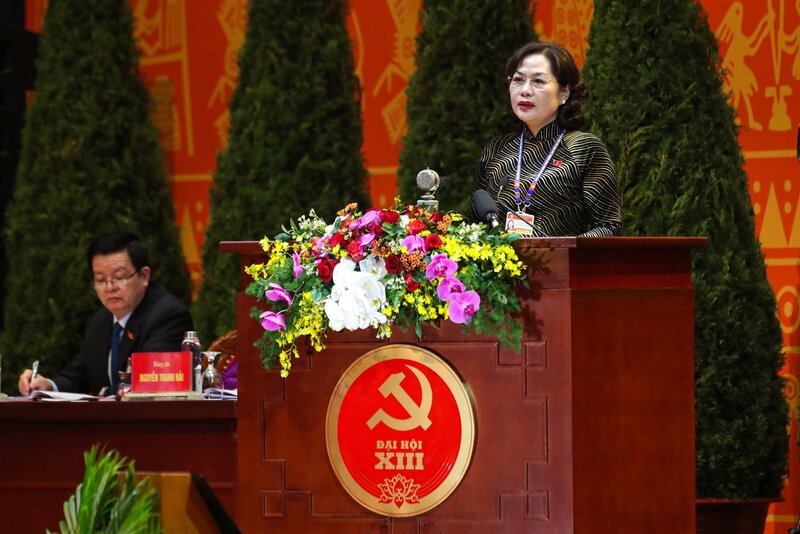Vietnam c.bank stands firm on keeping macro-economic stability
A stable macro-economic environment is essential for Vietnam to ensure economic independence and boost its resilience against external shocks.
The State Bank of Vietnam (SBV) will stand firm on the goals of putting the inflation under control and keeping stable macro-economic conditions.
| SBV’s Governor Nguyen Thi Hong. Photo: Nhat Bac |
“This is key to enhance the country’s economic independence and resilience during the global integration process with full of uncertainties and volatility at the moment,” stated SBV’s Governor Nguyen Thi Hong in the second day of the 13th National Party Congress.
As the Covid-19 pandemic is causing severe socio-economic consequences across the globe, central banks have opted for support programs of unprecedented scale worth trillions of dollars to help economies overcome the current crisis.
“Global economic uncertainties, therefore, are posing risks to the SBV’s efforts in managing monetary policy and banking sector, given the country’s high level of economic openness,” said Mrs. Hong.
According to Mrs. Hong, Vietnam had been able to contain the inflation rate below the 4% target of the National Assembly during the 2016-20 period, thanks to active and flexible management of monetary policy.
Meanwhile, interest rates for loans in priority fields in the past five years declined by 3.7% per annum compared to the 2011-15 period.
“The stability of the gold market, high foreign exchange reserves and the diminishing trend of dollarization in the economy have built trust among the business community on the Vietnamese dong,” stressed Mrs. Hong.
Mrs. Hong also noted the country’s credit policy is in the right direction and in line with the government’s efforts in containing inflation.
In the 2016-19, the credit growth averaged at 15% per year, and 12.13% in 2020, which is a moderate rate considering the weak credit demand due to the Covid-19 pandemic.
“The management of credit policy is closely related to a shift in economic growth model towards greater quality and efficiency,” said Mrs. Hong, referring to a credit growth of less than 14% in 2018-19 but the GDP growth expanding at a high rate of 7.08% and 7.02%, respectively.
Major goals in next 5 years
For the next five years, the SBV is committed to managing monetary and fiscal policies in an active and flexible manner to enhance economic resilience against global economic volatility, stated Mrs. Hong.
“The central bank will continue to build up foreign exchange reserves if the market conditions turn favorable to cushion possible economic blows,” she added.
Mrs. Hong said the bank aims to further reduce the dollarization in the economy and liberalize capital transaction in gradual steps.
"While the Covid-19 pandemic impacts still linger, we will continue to support enterprises and the people affected by the pandemic, including providing preferential loans in priority fields," Mrs. Hong said.
The SBV Governor also noted the urgency in applying technologies from the Industry 4.0 in payment methods as part of the national financial inclusion strategy and promoting e-payment within the public sector.











